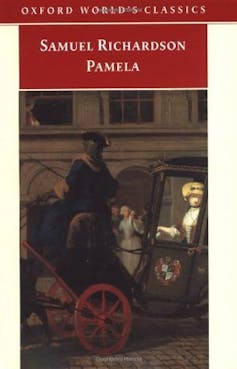Rape is a plot device in western literature, sold back to us by Hollywood
- Written by Camilla Nelson, Associate Professor of Writing, University of Notre Dame Australia
Woody Allen said it was “sad”. Quentin Tarantino said he needed to nurse his own “pain” and “emotions” about the revelations. Oliver Stone took it further – it was not just that he gave the nod to Woody Allen’s fear-mongering about “witch hunts”, adding warnings about the potential emergence of a “vigilante system” – but that he claimed people needed to understand disgraced producer Harvey Weinstein was also having a difficult time: “It’s not easy what he’s going through, either.”
One of the things that makes these statements offensive – and yes, I confess, they are offensive on many levels – is that they figure the alleged sexual harassment, assault and rape of women as just another plot point in a narrative that is fundamentally about men.
And perhaps we shouldn’t be surprised, because this is the narrative that has been sold by Hollywood’s dream factory for much of the last century.
In popular fiction - and in the many film adaptations of these notable books - rape is often deployed as a mechanical plot device to propel the hero on his narrative journey.
It turns a male character into a villain, or alternatively makes him heroic because he saves the hapless woman. In either case, the women are seldom characters in their own right, and if their pain is ever recognisable, then it’s invariably as a metaphor for something else.
And I’m not just talking about Game of Thrones, although it is an obvious case in point.
If you are as old as I am, then you will recollect the way in which your average English professor blithely brushed over the issue of sexual violence in his anxiety to get to the discussion about the aesthetic complexity of the composition of a sonnet.
 Image from the e-book edition of Leda and the Swan.
Goodreads
Image from the e-book edition of Leda and the Swan.
Goodreads
Take, for example, W.B. Yeats’s Leda and the Swan, which figures the “helpless breast”, the “loosening thighs” and the “white rush” of – well – this is a poem about rape.
Apologists often claim the rape of Leda is a metaphor for the conquest of Ireland, but this is hardly better. To put it academically, the “rape trope” or “rape as metaphor” displaces the actual, violent and traumatic act of rape. In short, there’s something deeply misogynistic in the way female rape victims continue to be cast as collateral damage on the way to something else.
Sexual violence in western literature
Any rudimentary survey of the history of western literature throws up an extraordinary amount of sexual violence. They are stories of victim blaming, slut shaming, sexual objectification, trivialisation and the denial and displacement of trauma.
And the rape scene is not just a problem that only concerns male writers with a predilection for adapting weird Greco-Roman myths. (Though there are many – if you weren’t learning about Leda and the Swan in English class then perhaps it was the rape of Persephone, Callisto, Daphne, Europa or Io … the list goes on.)
 Samuel Richardson’s Pamela, Or Virtue Rewarded, a book about the assault of a serving maid by her wealthy master, is perhaps better read as a lengthy tale about sexual harassment in the workplace – except for the fact that Pamela marries her would-be rapist; this is the “virtue rewarded” bit. In contrast the heroine of Richardson’s other well-known book, Clarissa, gets raped, repeatedly abducted, imprisoned, and then dies.
Much of the history of the novel might be seen as extended portrayal of dysfunctional relationships, the cultural product of a society in which men are propertied and powerful, women are disempowered, and the boundaries between sex and violence are blurry.
It’s only a hop, step and a jump to the masochistic romance narratives of Stephanie Meyer’s Twilight or E.L. James’s Shades of Grey.
Even where authors have seemingly set out to create positive representations of female sexual desire, the results can be uncanny. “I decidedly preferred these fierce favours to anything more tender,” says the eponymous heroine of Jane Eyre, whose paramour often seems to totter on the brink of actual physical attack. Yes, Rochester gets maimed in the end, and Jane scores a fortune, and this makes them more equal. But the fact that the hero is a man who locks his mad wife in the attic needs to be questioned.
Then there’s Heathcliff in Wuthering Heights. He hangs Isabella’s dog. Need I say more?
Taking issue with oppressive power fantasies
Of course, there are writers who have taken issue with oppressive power fantasies. Among the best known is Thomas Hardy’s Tess of the D’Urbervilles, a novel about a young woman who is raped by her employer, rejected by her husband, and turns on her abuser. Hardy draws attention to the fact that the habit of victim shaming runs so deep in our society that the victim has learnt to blame herself. “Why didn’t you tell me there was danger in men-folk?”
Hardy was careful to subtitle Tess “A Pure Woman”. And his insistence that Tess remains “pure” caused great consternation to his contemporaries. Not only should such a subtitle be read as a pre-emptive strike against critics who would interpret his text otherwise. It also contains the hint of an expectation that one day the world would be different.
Samuel Richardson’s Pamela, Or Virtue Rewarded, a book about the assault of a serving maid by her wealthy master, is perhaps better read as a lengthy tale about sexual harassment in the workplace – except for the fact that Pamela marries her would-be rapist; this is the “virtue rewarded” bit. In contrast the heroine of Richardson’s other well-known book, Clarissa, gets raped, repeatedly abducted, imprisoned, and then dies.
Much of the history of the novel might be seen as extended portrayal of dysfunctional relationships, the cultural product of a society in which men are propertied and powerful, women are disempowered, and the boundaries between sex and violence are blurry.
It’s only a hop, step and a jump to the masochistic romance narratives of Stephanie Meyer’s Twilight or E.L. James’s Shades of Grey.
Even where authors have seemingly set out to create positive representations of female sexual desire, the results can be uncanny. “I decidedly preferred these fierce favours to anything more tender,” says the eponymous heroine of Jane Eyre, whose paramour often seems to totter on the brink of actual physical attack. Yes, Rochester gets maimed in the end, and Jane scores a fortune, and this makes them more equal. But the fact that the hero is a man who locks his mad wife in the attic needs to be questioned.
Then there’s Heathcliff in Wuthering Heights. He hangs Isabella’s dog. Need I say more?
Taking issue with oppressive power fantasies
Of course, there are writers who have taken issue with oppressive power fantasies. Among the best known is Thomas Hardy’s Tess of the D’Urbervilles, a novel about a young woman who is raped by her employer, rejected by her husband, and turns on her abuser. Hardy draws attention to the fact that the habit of victim shaming runs so deep in our society that the victim has learnt to blame herself. “Why didn’t you tell me there was danger in men-folk?”
Hardy was careful to subtitle Tess “A Pure Woman”. And his insistence that Tess remains “pure” caused great consternation to his contemporaries. Not only should such a subtitle be read as a pre-emptive strike against critics who would interpret his text otherwise. It also contains the hint of an expectation that one day the world would be different.
 Roman Polanski at an event for his film, Tess of the D’Urbervilles, in 1979.
idmb
And yet, it seems that we are no further forward.
Tess was famously adapted for the screen by convicted child rapist Roman Polanski, who repressed the predatory and violent nature of Alec D’Urberville’s actions. (So too, do literary critics continue to debate whether Tess was “raped” or just “forcefully persuaded”.)
Then there’s the question of race.
Racial stereotypes are too often constructed at least partly out of sexual stereotypes, and sexual violence, and the figure of the “pure white woman” – and the predatory Black, Arabic or Indian male – is standard fare in the literature of the imperial “Civilising Mission”.
Toni Morrison’s Beloved stands alone as a novel for the astonishing way in which it intervenes in the representation of race and sexual violence, and for the way it addresses sexual violence as a systematic part of the culture of slavery. Often described in shorthand as a novel about infanticide, Beloved depicts a society in which the female characters are victims of rape and carry the scars of its consequences. A 1998 film adaptation saw Oprah Winfrey cast as Sethe.
I am certainly not advocating that any of these books should not be set on the curriculum. Or even be prefaced with a “trigger warning”. Rather, there’s an urgent need for these stories to be read again.
Not by interpreting power as “passion” and violence as “persuasion”, or glossing over the politics of sexual violence in order to get to the “aesthetics” of a text. These books are important precisely because they are a reflection of the oppressive societies that gave rise to them. And, indeed, function as a reminder that the oppression isn’t over yet.
Roman Polanski at an event for his film, Tess of the D’Urbervilles, in 1979.
idmb
And yet, it seems that we are no further forward.
Tess was famously adapted for the screen by convicted child rapist Roman Polanski, who repressed the predatory and violent nature of Alec D’Urberville’s actions. (So too, do literary critics continue to debate whether Tess was “raped” or just “forcefully persuaded”.)
Then there’s the question of race.
Racial stereotypes are too often constructed at least partly out of sexual stereotypes, and sexual violence, and the figure of the “pure white woman” – and the predatory Black, Arabic or Indian male – is standard fare in the literature of the imperial “Civilising Mission”.
Toni Morrison’s Beloved stands alone as a novel for the astonishing way in which it intervenes in the representation of race and sexual violence, and for the way it addresses sexual violence as a systematic part of the culture of slavery. Often described in shorthand as a novel about infanticide, Beloved depicts a society in which the female characters are victims of rape and carry the scars of its consequences. A 1998 film adaptation saw Oprah Winfrey cast as Sethe.
I am certainly not advocating that any of these books should not be set on the curriculum. Or even be prefaced with a “trigger warning”. Rather, there’s an urgent need for these stories to be read again.
Not by interpreting power as “passion” and violence as “persuasion”, or glossing over the politics of sexual violence in order to get to the “aesthetics” of a text. These books are important precisely because they are a reflection of the oppressive societies that gave rise to them. And, indeed, function as a reminder that the oppression isn’t over yet.
Authors: Camilla Nelson, Associate Professor of Writing, University of Notre Dame Australia




